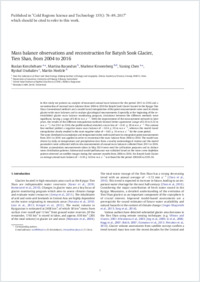Mass balance observations and reconstruction for Batysh Sook Glacier, Tien Shan, from 2004 to 2016
- Kenzhebaev, Ruslan State Key Laboratory of Desert and Oasis Ecology, Xinjiang Institute of Ecology and Geography, Chinese Academy of Sciences, Urumqi, China
- Barandun, Martina Department of Geoscience, University of Fribourg, Switzerland
- Kronenberg, Marlene Department of Geoscience, University of Fribourg, Switzerland - Meteodat GmbH, Zurich, Switzerland
- Chen, Yaning State Key Laboratory of Desert and Oasis Ecology, Xinjiang Institute of Ecology and Geography, Chinese Academy of Sciences, Urumqi, China
- Usubaliev, Ryskul Central Asian Institute of Applied Geosciences (CAIAG), Bishkek, Kyrgyzstan
- Hoelzle, Martin Department of Geoscience, University of Fribourg, Switzerland
-
20.12.2016
Published in:
- Cold Regions Science and Technology. - 2017, vol. 135, p. 76-89
English
In this study we present an analysis of measured annual mass balances for the period 2011 to 2016 and a reconstruction of seasonal mass balances from 2004 to 2010 for Batysh Sook Glacier located in the Kyrgyz Tien Shan. Conventional methods and a model-based extrapolation of the point measurements were used to obtain glacier- wide mass balances and to analyze glaciological measurements. Especially at the beginning of the re-established glacier mass balance monitoring program, deviations between the different methods were significant, having a range of 0.40 m w.e. a− 1. With the improvement of the measurement network in later years, the results of the different extrapolation methods showed better agreement (range of 0.10 to 0.22 m w.e. a− 1). For 2011 to 2016, the profile method revealed a mass loss of − 0.41 ± 28 m w.e. a− 1. The contour line method yielded a negative mean mass balance of − 0.34 ± 20 m w.e a− 1, whereas the model-based extrapolation clearly resulted in the most negative value of − 0.43 ± 16 m w.e. a− 1 for the same period.The same distributed accumulation and temperature index melt model used to extrapolate point measurements from 2011 to 2016 was applied in order to reconstruct the mass balance from 2004 to 2010. The model was driven by daily air temperature and precipitation data from a nearby meteorological station and the model parameters were calibrated with in-situ measurements of annual mass balances collected from 2011 to 2016. Winter accumulation measurements taken in May 2014 were used for calibration purposes and to deduce snow distribution patterns. Subseasonal model performance was validated based on the snow cover depletion pattern observed on satellite images during the summer months from 2004 to 2016. For Batysh Sook Glacier an average annual mass balance of − 0.39 ± 0.26 m w.e. a− 1 was found for the period 2003/04 to 2015/16.
- Faculty
- Faculté des sciences et de médecine
- Department
- Département de Géosciences
- Language
-
- English
- Classification
- Hydrology
- License
- License undefined
- Identifiers
-
- RERO DOC 288655
- DOI 10.1016/j.coldregions.2016.12.007
- Persistent URL
- https://folia.unifr.ch/unifr/documents/305513
Statistics
Document views: 100
File downloads:
- hoe_mbo.pdf: 306
